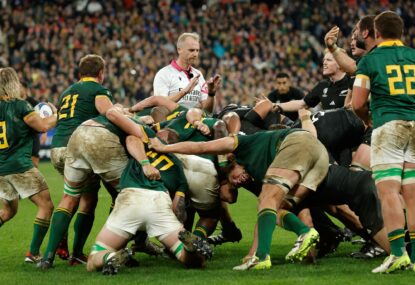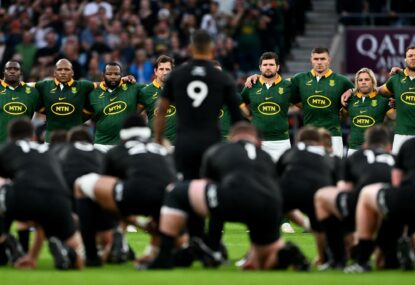I was recently in Donegal, Ireland, at a family gathering. While there I visited the town of Ramelton with my uncle Joe, which is the birthplace of rugby player David Gallaher.
Gallaher emigrated to New Zealand with his family at a young age and became the captain of the first New Zealand rugby team to tour Europe in 1905. The team were the first international rugby team to tour Europe and also the first New Zealalnd team to carry the nickname of All Blacks.
Gallaher was born in 1873 and joined his family on the Lady Jocelyn as a number of Ulster natives emigrated to New Zealand. The Gallaher family lived in Katikati, where David began his rugby career, soon gaining notice. He started out as a hooker, but would gain most of his plaudits as a wing-forward.
The family moved to Auckland in 1895, where Gallaher played for the Ponsonby club. He was first selected to play for Auckland in 1896. Gallaher would play 26 times for Auckland, and would be a member of the first team in New Zealand to hold the Ranfurly Shield.
In 1901, Gallaher took a break from rugby when he signed up to fight in the Second Boer War, where he served with distinction. He also played some rugby in South Africa, captaining the New Zealand military side, which won the inter-forces rugby championship.
He returned to New Zealand in 1902 and resumed playing rugby a year later. He gained his first cap for New Zealand while on a tour of Australia in 1903, in what was New Zealand’s first ever Test match. He was also the first player from the Ponsonby club to play for New Zealand.
He gained more distinction in 1904, when he played in New Zealand’s first home international, against the touring British Isle’s Rugby Team (later to be known as the Lions). New Zealand beat the Lions, 9-3. Gallaher’s Auckland team also beat the Lions, 13-0. These were the only defeats suffered by the Lions team on that tour, and the first defeats suffered by the Lions in New Zealand.
Gallaher temporarily had a falling out with the New Zealand Rugby Football Union when he tried to claim travelling expenses for the international. The union weren’t best pleased and Gallaher eventually paid the money himself, under protest.
Gallaher’s experience and ability gained him the captaincy of the first New Zealand team to tour Europe, in 1905, though the players weren’t happy about his selection, believing it to be part of an Auckland monopoly of the team. It was tradition at the time for the players on a touring team to pick the captain themselves. Yet Gallaher soon won them over.
New Zealand played their first match of the tour against the English county side of Devon. Devon were a strong side, and would win the English County Championship that season. Rugby pundits at the time, being unfamiliar with the strength of New Zealand rugby, predicted that New Zealand would be lucky to gain a draw.
Instead, the tourists ran rampant, eventually winning the match, 55-4. The papers were so astonished that early reports had the result as 5-4, and some even had Devon winning by 55-4. Such scores were unheard of at the time, especially at the senior level (bear in mind that a try was only worth three points, with a converted try worth five points. A drop goal was worth four points, and a penalty, three).
These high scores would soon become commonplace. New Zealand would eventually win 34 of their 35 contests – including matches in France and the United States – and scored a total of 976 points, with only 59 points conceded.
The one blot on New Zealand’s copybook was against Wales. Wales won a very close game, 3-0. New Zealand’s Bob Deans crossed the line, but the referee judged that he was held up in the tackle and refused to award an equalising try.
Gallaher himself was a magnet for controversy. He was the pioneer of the wing-forward style of play. At the time, all eight forwards would stay in the scrum until the ball was released. Gallaher instead broke away and disrupted the opposition’s play.
The unions in the British Isles looked on this unfavourably, believing it to be against the rules and the spirit of the game. So much did they object to the different interpretations of the rules, that New Zealand were denied representation on the International Rugby Football Board until 1948. The home unions eventually banned the position of wing-forward, in 1931.
Gallaher retired from playing rugby when the New Zealand team returned home, but he remained a selector for both Auckland and New Zealand until 1916. Both teams had very successful runs with him as selector, winning about two thirds of their matches.
Gallaher signed up to fight in World War I, despite being over the age of conscription. He died in action in 1917. Gallaher was one of thirteen former All Blacks who were killed in action during the first World War.
In 1922, Auckland introduced the Gallaher Shield, which is awarded to the winner of the men’s club competition. Since 2000, France and New Zealand have contested the Dave Gallaher Trophy.
Gallaher’s birthplace of Ramelton unveiled a plaque to him in 2005. The unveiling was witnessed by the 2005 All Blacks, who were touring Europe at the time. The local rugby club, Letterkenny RFC, have also renamed their home ground the Dave Gallaher Memorial Park.
A great man, who contributed so much to the game of rugby, and to life in general. It was an honour to visit his birthplace.


































































































